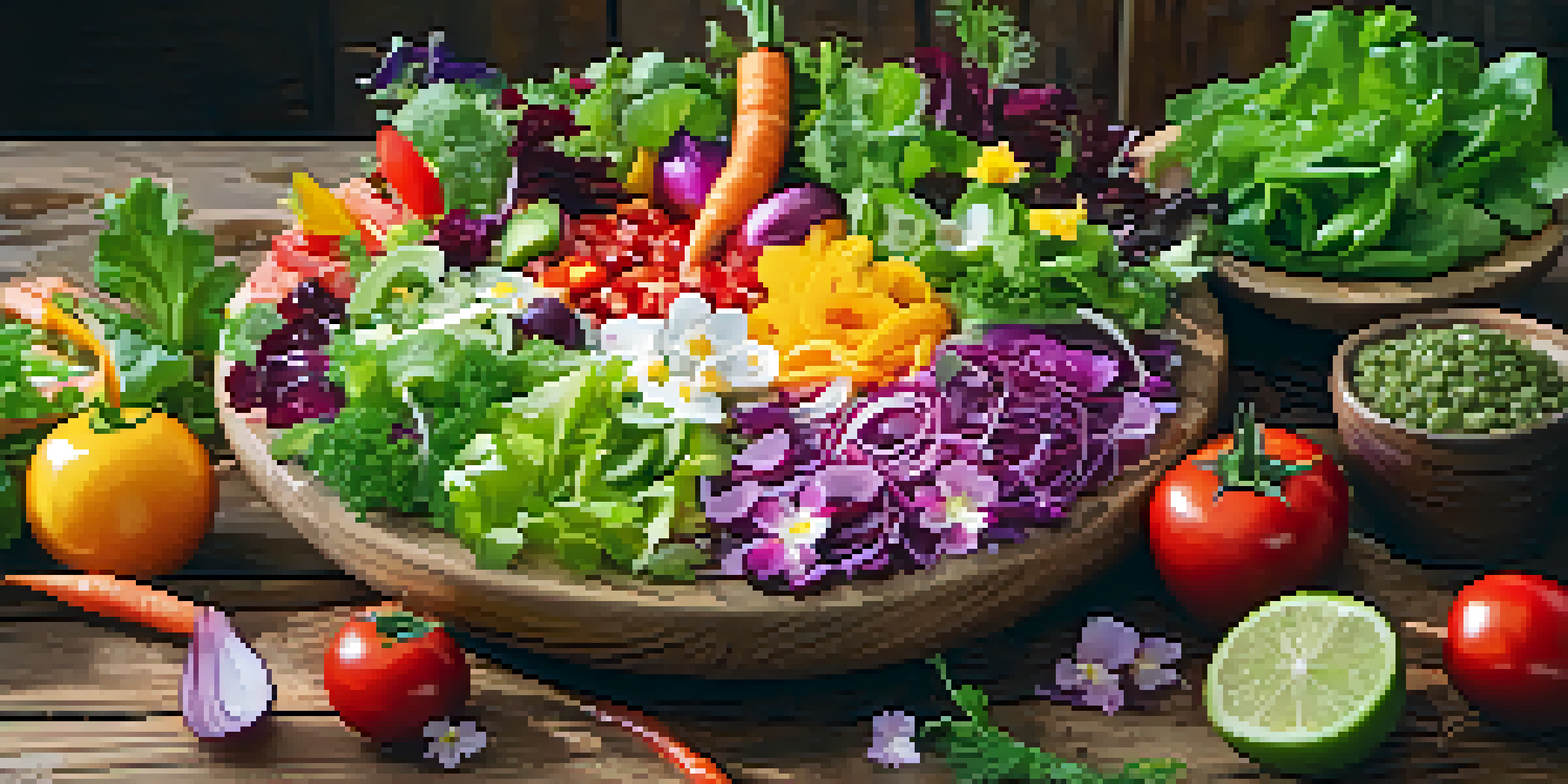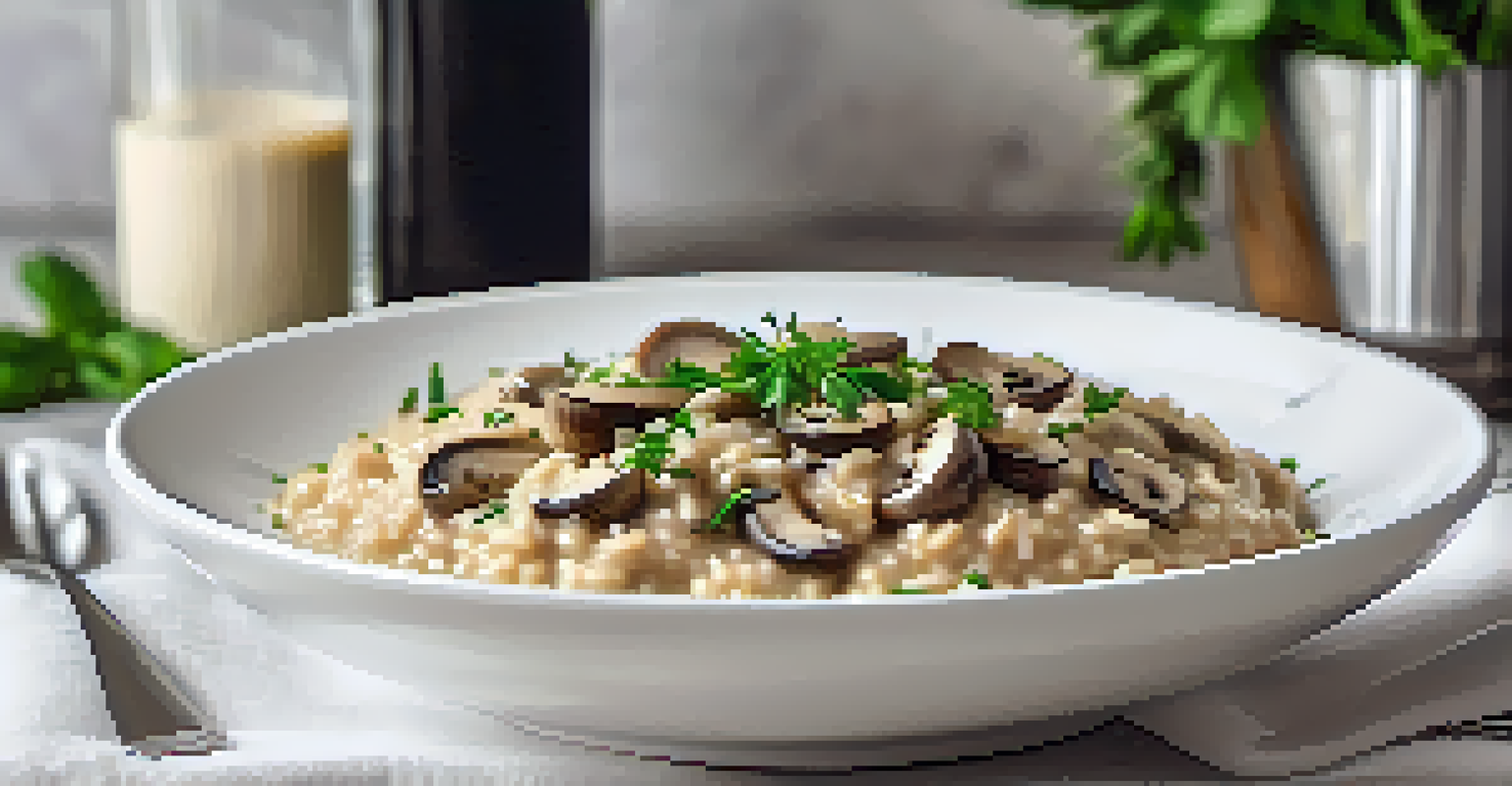Judging Criteria in Vegan Culinary Competitions Explained

Importance of Presentation in Vegan Culinary Contests
The visual appeal of a dish can be a game-changer in competitions. Judges often believe that we eat with our eyes first, so an attractive presentation can elevate a dish's perceived quality. For instance, vibrant colors and artistic plating can capture attention and intrigue.
We eat with our eyes first.
In vegan competitions, where creativity can shine through plant-based ingredients, presentation becomes even more crucial. A well-presented dish not only showcases the chef’s skills but also highlights the beauty of vegan ingredients. Imagine a colorful salad artfully arranged—it's hard to resist!
Moreover, the presentation can set the tone for the overall dining experience. It can evoke emotions and tell a story about the dish's origin or concept, making it memorable for the judges. Thus, chefs should invest time in perfecting the look of their plates.
Taste: The Heart of Vegan Culinary Competitions
When it comes to culinary competitions, taste is undeniably the star of the show. Judges assess flavor profiles, balance, and the overall enjoyment of the dish. In vegan cooking, this means utilizing spices, herbs, and cooking techniques to create depth and richness without animal products.

Ultimately, the goal is to provide a delightful experience that surprises the judges, enhancing their perception of vegan cuisine. For example, a well-made vegan mushroom risotto can impress with its umami flavor, leaving a lasting impression.
Presentation Enhances Perceived Quality
An attractive presentation can significantly elevate a dish's perceived quality, especially in vegan competitions where creativity thrives.
Taste is not just about seasoning; it also encompasses texture. A dish that combines creamy, crunchy, and chewy elements can create a memorable experience. Thus, chefs need to pay close attention to how they can marry flavors and textures harmoniously.
Creativity and Innovation in Vegan Dishes
In vegan culinary competitions, creativity is often a key criterion that sets contestants apart. Judges look for original ideas and unique approaches to traditional dishes, pushing the boundaries of plant-based cooking. Chefs are encouraged to think outside the box and present something unexpected.
Food is not just about sustenance, it's about connection and cultural expression.
For example, transforming classic comfort foods, like mac and cheese, into a vegan delight using cashews and nutritional yeast can showcase both creativity and skill. Judges appreciate when a chef invents new flavor combinations or reinterprets familiar dishes in innovative ways.
Creativity also extends to ingredient choices and cooking methods. Using lesser-known vegan ingredients or incorporating global flavors can elevate a dish. This innovation not only excites the judges but also reflects the evolving nature of vegan cuisine.
Nutritional Value: A Vital Component in Judging
As veganism often emphasizes health and sustainability, nutritional value plays a significant role in culinary competitions. Judges assess whether the dishes provide a well-rounded balance of nutrients, such as proteins, vitamins, and minerals, which are often sourced from diverse plant-based ingredients.
For instance, a dish that combines lentils, quinoa, and a variety of vegetables can score high in nutritional content, demonstrating the chef's understanding of healthy eating. This not only appeals to health-conscious judges but also showcases the chef’s knowledge of vegan nutrition.
Taste is the Core of Competitions
Judges prioritize taste, evaluating flavor profiles and textures to create a delightful experience in vegan culinary contests.
Therefore, chefs should aim to create dishes that are not only delicious but also nourishing. By highlighting the health benefits of their creations, contestants can reinforce the positive attributes of vegan cuisine.
Technical Skills: Mastery of Culinary Techniques
Technical skills are foundational in every culinary competition, including vegan contests. Judges evaluate the chef's ability to execute cooking techniques accurately, whether it's sautéing, baking, or fermentation. Flawless execution can demonstrate a chef's professionalism and commitment to their craft.
For example, a perfectly baked vegan pastry can showcase not only the chef's baking skills but also their understanding of plant-based substitutes. Mastery of techniques such as emulsification for dressings or achieving the right texture in cheese alternatives can significantly impact scores.
Moreover, the ability to adapt traditional techniques to vegan cooking can impress judges. It highlights innovation and respect for culinary traditions, showcasing how vegan chefs can maintain high standards in their cooking.
Sustainability: A Critical Factor in Vegan Cooking
In the realm of vegan culinary competitions, sustainability is an increasingly important criterion. Judges often look for dishes that reflect environmentally conscious practices, such as using locally sourced ingredients or minimizing food waste. This aligns with the core values of veganism, promoting a healthier planet.
For instance, a dish that features seasonal vegetables from local farmers not only supports the community but also reduces the carbon footprint associated with transportation. Judges appreciate when chefs make intentional choices that embody sustainability in their cooking.
Sustainability Reflects Vegan Values
In vegan cooking, sustainability is crucial, as judges seek dishes that embody environmentally conscious practices.
By emphasizing sustainable practices, chefs can connect with judges on a deeper level, showcasing their commitment to the values of veganism. This not only enhances the dish's appeal but also resonates with the growing awareness around environmental issues.
Cultural Relevance: Honoring Culinary Heritage
Cultural relevance is another criterion that can influence judging in vegan culinary competitions. Dishes that honor and incorporate traditional flavors or techniques can show respect for diverse culinary heritages. This adds another layer of depth to the competition entries.
For example, a vegan take on an Indian curry using authentic spices can showcase the chef's understanding of cultural nuances while adapting it to a plant-based format. Judges often appreciate when chefs pay homage to their roots while showcasing innovation.

Furthermore, integrating cultural stories into the dishes can create a more meaningful experience for the judges. It allows chefs to express their personal connection to food and its history, making for a compelling presentation.